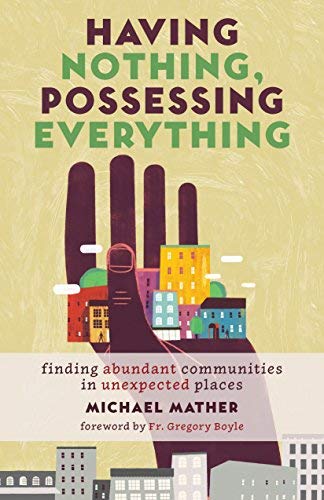What do you think?
Rate this book


160 pages, Kindle Edition
Published October 18, 2018
I have read many books on 'urban ministry' or community development. I have a master's degree in social service administration, and my job is non-profit consulting. Having Nothing, Possessing Everything is not a unique take, but it is well told. In an overly simplified form, this is a church that has taken the Asset Based Community Development model (look to develop the strengths of the community more than bringing in resources to address the weaknesses.) I broadly support the ABCD model, but it is not simple to implement well (or easily replicable), and some use the model as an excuse not to address systemic issues or immediate needs.
I think the story focus of Having Nothing, Possessing Everything does an excellent job of exploring what is and is not meant here. Mather takes on traditional social ministry, unconstrained capitalism, consumerism, and the lack of resources in a helpful way. I wish he dealt more directly with race, although it is in the background throughout the book.
At the end of the book, there is an exploration of a set of six principles that I think are helpful. They are the principle that guides both how partnerships work and the ideals of the church
As part of fulfilling the six principles, the church stopped tracking standard goals and started 'gamifying' their targets. (You can read more about this in the quote toward the bottom of this page). The following quote is an example of how the team received points:
Count the number of times you ate with someone and reminded them during the meal of the communion that Jesus shared with his friends on Maundy Thursday and of Christ’s presence at their table. Count the number of times you went and offered forgiveness to someone who was laboring under guilt and shame. Count the number of times you threw a party to celebrate the presence and power of God’s love in the people and parish around you. Count the number of times you took your Bible and read a story to someone whose life you see in that particular story. Count the number of times you posted on Facebook celebrating in concrete and joyful ways the discipleship/vocation of the people in your parish.
Throughout the book, Mather mostly told stories of other people. He illustrated how he learned, but the success stories mainly were of others. This isn't only an excellent method, it appears to be essential to actually how the church has had success. Michael Mather was the pastor, but without a partner who primarily worked in the community and made personal connections and listened to people's stories and helped discern gifts and skills around the church, Mather's ability to pastor and get funding, and tell stories would have been worthless. Because it is in hearing stories and building relationships where this type of work matters. And where the church ministry understands most deeply was in how they did not orient the relationships around them (you relate to me, and I relate to this other person), they sought ways to facilitate involvement and connection outside of themselves.
Where I do lament a bit is that many people are doing similar work, but the stories told publicly, and the books published are still mostly done by old White guys. Mather certainly has put in his time and faithfully done ministry. But as he points out, most of that ministry wasn't done by him or thought up by him. Mather was slower to learn than many of those around him that were teaching him. But he still was the one that published the book and told the stories. He is undoubtedly skilled at telling them, but the reality of the world is market forces and a lot of unstated assumptions impact who tells stories. And we do not hear all of the stories that should be told, and in many cases, some of the good stories like this may point to others, or they may inoculate readers from hearing better, more representative stories.